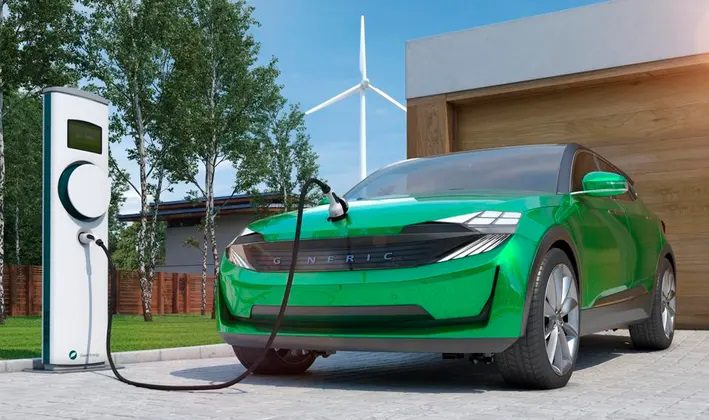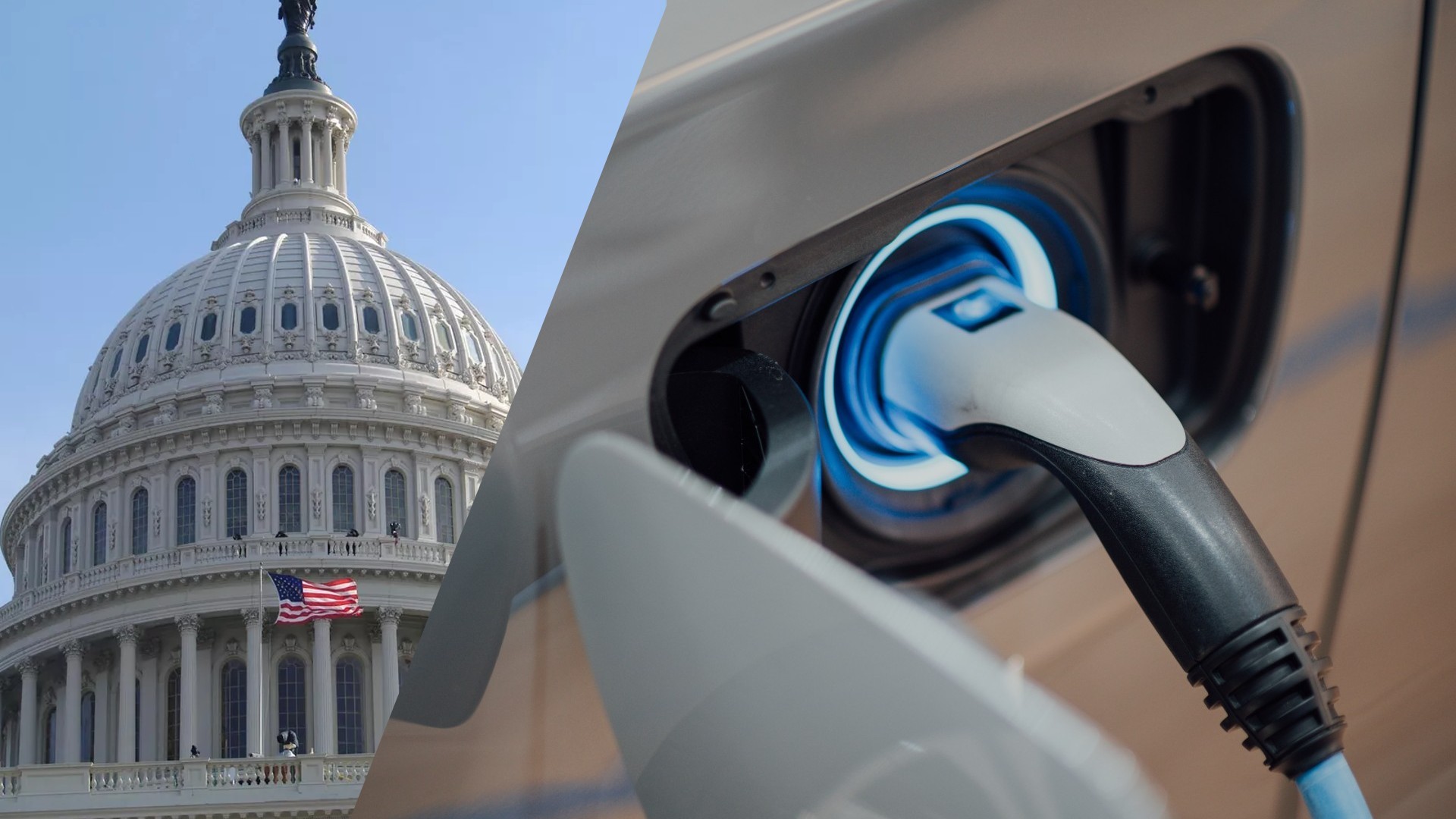There’s Something Sinister with the Big Push for Electric Vehicles
25 refrigerators.
That’s how much the additional electricity consumption per household would be if the average US home adopted electric vehicles (EVs).

Congressman Thomas Massie—an electrical engineer—revealed this information while discussing with Pete Buttigieg, the Secretary of Transportation, President Biden’s plan to have 50% of cars sold in the US be electric by 2030.
The current and future grid in most places will not be able to support each home running 25 refrigerators—not even close. Just look at California, where the grid is already buckling under the existing load.
Massie claims that the notion of widespread adoption of electric vehicles anytime soon is a dangerous fantasy based on political science, not sound engineering.
Nonetheless, governments, the media, academia, large corporations, and celebrities tout an imminent “transition” to EVs as if it’s preordained from above.
It’s not.
They’re trying to manufacture your consent for a scam of almost unimaginable proportions.
Below are three reasons why something sinister is going on with the big push for EVs.
But first, a necessary clarification. You no doubt have heard of the term “fossil fuels” before. When the average person hears “fossil fuels,” they think of a dirty technology that belongs in the 1800s. Many believe they are burning dead dinosaurs to power their cars.
They also think “fossil fuels” will destroy the planet within a decade and run out soon—despite the fact that, after water, oil is the second most abundant liquid on this planet.
None of these ridiculous notions are true, but many people believe them. Using propaganda terms like “fossil fuels” plays a large role.
Orwell was correct when he said that corrupting the language can corrupt people’s thoughts.
We suggest expunging “fossil fuels” from your vocabulary in favor of hydrocarbons—a much better and more precise word.
A hydrocarbon is a molecule made up of carbon and hydrogen atoms. These molecules are the building blocks of many different substances, including energy sources like coal, oil, and gas. These energy sources have been the backbone of the global economy for decades, providing power for industries, transportation, and homes.
Now, on to the three reasons EVs are a giant scam at best and possibly something much worse.
Reason #1: Electric Vehicles (EVs) Are Not Green
The central premise for EVs is they help to save the planet from carbon because they use electricity instead of gas.
It’s astounding so few think to ask, what generates the electricity that powers EVs?
Hydrocarbons generate over 60% of the electricity in the US. That means there’s an excellent chance that oil, coal, or gas is behind the electricity charging an EV.
It’s important to emphasize carbon is an essential element for life on this planet. It’s what humans exhale and what plants need to survive.
After decades of propaganda, Malthusian hysterics have created a twisted perception in many people’s consciousness that carbon is a dangerous substance that needs to be reduced to save the planet.
Let’s entertain this bogus premise momentarily and assume carbon is bad.
Even by this logic, EVs do not really reduce carbon emissions; they just rearrange them.
Further, extracting and processing the exotic materials needed to make EVs requires tremendous power in remote locations, which only hydrocarbons can provide.
Additionally, EVs require an enormous amount of rare elements and metals—like lithium and cobalt—that companies mine in conditions that couldn’t remotely be considered friendly to the environment.
Analysts estimate that each EV requires around one kilogram of rare earth elements. Extracting and processing these rare elements produces a massive amount of toxic waste. That’s why it mainly occurs in China, which doesn’t care much about environmental concerns.
In short, the notion that EVs are green is laughable. It’s simply the thin patina of propaganda that governments need as a pretext to justify the astronomical taxpayer subsidies for EVs.

Reason #2: EVs Can’t Compete Without Government Support
For many years, governments have heavily subsidized EVs through rebates, sales tax exemptions, loans, grants, tax credits, and other means.
According to the Wall Street Journal, US taxpayers will subsidize EVs by at least $393 billion in the coming years—more than the GDP of Hong Kong.
To put that in perspective, if you earned $1 a second 24/7/365—about $31 million per year—it would take you over 12,677 YEARS to make $393 billion.
And that’s not even considering the immense subsidies and government support that have occurred in the past.
Furthermore, governments impose burdensome regulations and taxes on gasoline vehicles to make EVs seem relatively more attractive.
Even with this enormous government support, EVs can barely compete with gasoline vehicles.
According to J.D. Power, a consumer research firm, the average EV still costs at least 21% more than the average gasoline vehicle.
Without government support, it’s not hard to see how the market for EVs would evaporate as they would become unaffordable for the vast majority of people.
In other words, the EV market is a giant mirage artificially propped up by extensive government intervention.
It begs the question, why are governments going all out to push an obviously uneconomic scam?
While they are undoubtedly corrupt thieves and simply stupid, something more nefarious could also be at play.
Reason #3: EVs Are About Controlling You
EVs are spying machines.
They collect an unimaginable amount of data on you, which governments can access easily.
Analysts estimate that cars generate about 25 gigabytes of data every hour.
Seeing how governments could integrate EVs into a larger high-tech control grid doesn’t take much imagination. The potential for busybodies—or worse—to abuse such a system is obvious.
Consider this. The last aspect any government wants is an incident like what took place with the Canadian truckers rebelling against vaccine mandates.
Had the Canadian truckers’ vehicles been EVs, the government would have been able to stamp out the resistance much easier.
Here’s the bottom line.
The people really in charge do not want the average person to have genuine freedom of movement or access to independent power sources.
They want to know everything, keep you dependent, and have the ability to control everything, just like how a farmer would with his cattle. They think of you in similar terms.
That’s why gasoline vehicles have to go and why they are trying to herd us into EVs.
Conclusion
To summarize, EVs are not green, cannot compete with gas cars without enormous government support, and are probably a crucial piece of the emerging high-tech control grid.
The solution is simple: eliminate all government subsidies and support and let EVs compete on their own merits in a totally free market.
But that’s unlikely to occur.
Instead, it’s only prudent to expect them to push EVs harder and harder.
If EVs were simply government-subsidized status symbols for wealthy liberals who want to virtue signal how they think they’re saving the planet, that would be bad enough.
But chances are, the big push for EVs represents something much worse.
Along with 15-minute cities, carbon credits, CBDCs, digital IDs, phasing out hydrocarbons and meat, vaccine passports, an ESG social credit system, and the war on farmers, EVs are likely an integral part of the Great Reset—the dystopian future the global elite has envisioned for mankind.
In reality, the so-called Great Reset is a high-tech form of feudalism.
Sadly, most of humanity has no idea what is coming.
Worse, many have become unwitting foot soldiers for this agenda because they have been gaslighted into believing they are saving the planet or acting for the greater good.
This trend is already in motion, and the coming weeks will be pivotal.
yogaesoteric
October 3, 2023
